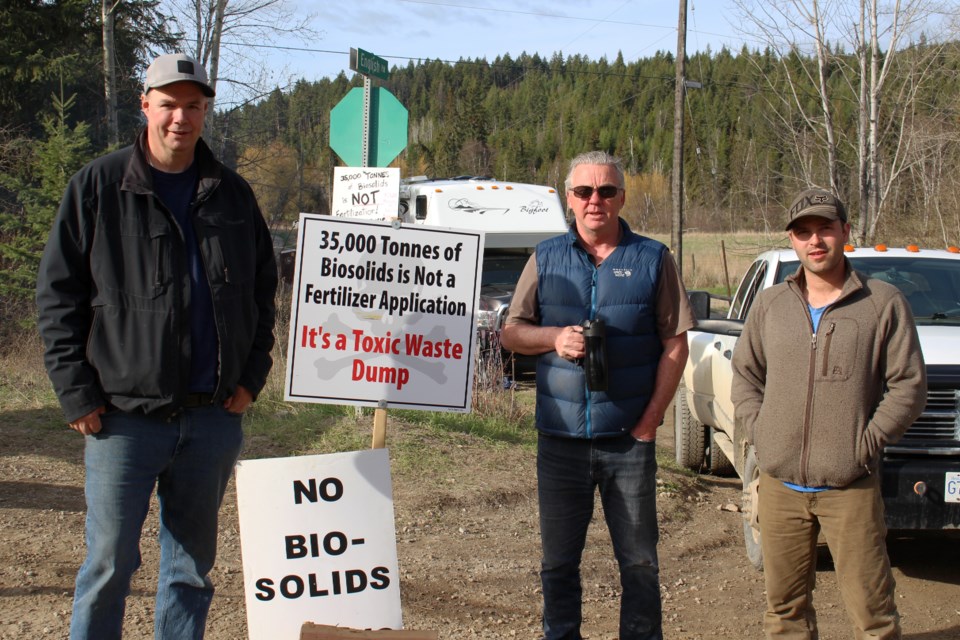
Protesters in Turtle Valley recently packed up their roadblock, confident that their biosolids battle with the City of Kamloops was over until at least the snow thaws.
Opposed to the spreading of the city's biosolids by Arrow Transportation at a local bison ranch, the small community took to the streets and courts of Kamloops this spring to try and stop the sewage. Eventually, they set up a roadblock to keep Arrow trucks from getting to the bison ranch.
In June, an application for an injunction, made by Turtle Valley residents, was rejected by BC Supreme Court Justice Dev Dley.
However, residents and local First Nations kept a blockade in place over the course of the summer and none of the City of Kamloops' biosolids were hauled out to the bison ranch.
There was also no sludge spread at Talking Rock Golf Resort, which was slated to be the original destination for the city's biosolids through a partnership with the Little Shuswap Lake Indian Band. That plan was put on hold after delays in getting federal permitting to spread biosolids on band land.
"We're still continuing to work through all of the challenges at both the Talking Rock golf course project and the Turtle Valley project," says Greg Wightman, the city's utilities services manager. "(It's) very complicated processes in both cases but we're still working towards seeing those projects come to fruition at some point here."
The City of Kamloops awarded the contract to Arrow in December 2018. Wightman says there is language in their two-year contract with Arrow that covers what happens if they aren't able to dispose of Kamloops' biosolids, but they haven't explored those options yet because they're confident they'll come up with a solution.
Jeff Mayer, Arrow’s environmental services regional manager, was not available for comment this week.
Because of the lack of movement from Arrow trucks and with the change of seasons coming, the Turtle Valley roadblock was removed at the end of October.
"We're not wanting to celebrate too early but we're happy for the outcome; this year, there's nothing coming in here," says spokesperson Connie Seaward.
 Protesters continued to prevent Arrow Transportation from driving trucks up to the ranch in Turtle Valley all summer. (via Cavelle Layes)
Protesters continued to prevent Arrow Transportation from driving trucks up to the ranch in Turtle Valley all summer. (via Cavelle Layes)The group knows that no major movement will happen on biosolids spreading until the provincial government has finished its review of the Organic Matter Recycling Regulation (OMRR) of B.C. The regulation has been undergoing a "comprehensive review" since 2018 to "ensure it remains protective of human health and the environment."
"That's one of the biggest challenges we're having right now, the OMRR has been under review for quite a long time and, unfortunately, we still have no clarity from the province on where that regulation may end up once the review process is over," says Wightman. "They've told us the latest is spring of 2020 and we're hopeful that will be the case but until we know where that regulation is going, there's still a lot of uncertainty over biosolids use in B.C."
The protesters would like to see the OMRR expand required testing to address their concerns with biosolids, which go beyond a "handful of metals that already exist in the soil."
"From the very beginning, the whole community of Turtle Valley just wants this tested," says Seaward. "If they say that it's as safe as it is, then why won't they show us test results for the metals, plastics, the freons, the pharmaceuticals, everything else that we're wondering about?"
While speaking to city council in June, Wightman said it was difficult to test for pharmaceuticals or other substances in biosolids; traces can be so small, measurements can be as small as parts per trillion. He cited a study from Urban Agriculture and Regional Food Systems that showed it would take over 24,000 years of exposure to the compound in biosolids needed to reach the equivalent of one therapeutic dose of ibuprofen.
"What it comes down to in biosolids, it's all about information and informing people and making sure they have accurate information in front of them and that's the battle we continue to try and fight," he says. "We're trying to give them reliable scientific sources, not information they get from Facebook and that's a battle we continue to try and work through there, making sure people have the right information as they're trying to make decisions on their views on this."
The City of Kamloops produces an average of 12,500 bulk tonnes of biosolids each year and also has 23,000 tonnes of stockpiled matter that needs to be dealt with.

 Woman died 'suspiciously'
Woman died 'suspiciously' Watchdog slams province
Watchdog slams province Midway transformer fire
Midway transformer fire Sask. will still get rebates
Sask. will still get rebates 'Cheap political points'
'Cheap political points' Plastic treaty talks underway
Plastic treaty talks underway U.S. reporter remains jailed
U.S. reporter remains jailed $620 million for Ukraine
$620 million for Ukraine  5 die crossing channel
5 die crossing channel PepsiCo beats Q1 forecasts
PepsiCo beats Q1 forecasts Equifax testing rental data
Equifax testing rental data  Tourism operators struggle
Tourism operators struggle  Leafs even series
Leafs even series Cristall gets pro look
Cristall gets pro look Warriors even series in OT
Warriors even series in OT Bam Margera’s tour axed
Bam Margera’s tour axed Seinfeld: movie biz is 'over'
Seinfeld: movie biz is 'over' A Knight's Tale sequel axed
A Knight's Tale sequel axed















